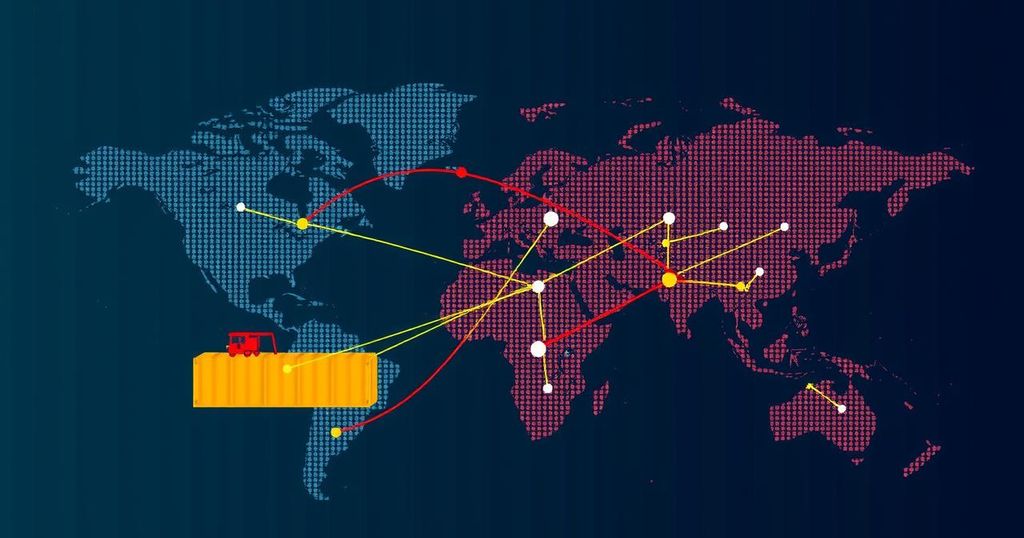Impending Tariffs from Trump: Global Corporations Brace for Impact

President-elect Donald Trump has pledged tariffs on major trade partners—Canada, Mexico, and China—potentially triggering trade wars. Various sectors, particularly automotive companies such as Audi, BMW, and Honda, are poised to be significantly impacted. Other industries like electronics and packaged goods are also preparing for challenges due to these proposed trade tariffs. The situation warrants close monitoring as companies reassess their strategies in response to potential economic disruptions.
In late November, President-elect Donald Trump announced his intention to impose tariffs on the United States’ three largest trading partners—Canada, Mexico, and China—signaling potential trade wars in the near future. This decision could significantly impact various sectors, particularly the automotive industry, which includes prominent manufacturers such as Audi, BMW, and Toyota, many of whom have extensive production facilities in Mexico and rely heavily on exports to the U.S. market. Other affected industries include electronics, retail, and packaged goods, with companies like Foxconn, H&M, and Procter & Gamble anticipating challenges due to these tariffs.
The automotive sector stands to be the most affected, as several companies have substantial operations in Mexico. Audi’s plant in San Jose Chiapa, for example, contributed nearly 40,000 vehicles to the U.S. market in the first half of 2024. Similarly, Honda and Kia have expressed concerns over the potential economic impact should tariffs be enforced on their Mexican imports. As supply chains become uncertain, companies are beginning to explore alternatives or adjustments in production to mitigate the risks. In the electronics domain, key players such as LG Electronics and Samsung have also begun reviewing their strategies in light of the impending tariffs, impacting the availability of their products in the U.S. retail space.
The backdrop of this situation is rooted in Trump’s campaign promises, which aimed at prioritizing American manufacturing and challenging trade imbalances with major global partners. These tariffs could lead to significant shifts in production locations and strategies for many international firms, prompting them to reassess their supply chains and market strategies. Furthermore, companies within sectors such as food and drink, retail, and packaged goods that import from Mexico or China are bracing for potential price hikes and supply chain disruptions.
“First of all, the tariffs, it’s still a potential. We don’t know where that’s going to go. It’s a total uncertainty,” said Kenneth Bull, COO and interim CEO of Five Below.
The situation warrants close monitoring, especially as further details about the tariffs and their implementation are forthcoming. However, it is clear that if enforced, these tariffs may not only strain trade relations but also have significant ramifications for global corporations operating in or relying on trade with Mexico and Canada. The broader economic landscape, particularly regarding consumer prices and product availability, is poised for disruption if the tariffs are enacted.
In conclusion, the upcoming tariffs outlined by President Trump could instigate widespread economic repercussions across multiple sectors, particularly in automotive, electronics, and retail. Companies with substantial operations in Mexico are evaluating their strategies to adapt to the new trade environment. The potential for trade wars looms, necessitating proactive measures from businesses to safeguard their operations and maintain market stability.
The announcement of tariffs on major trading partners by President-elect Donald Trump comes as a direct fulfillment of his campaign pledges, aimed at addressing trade imbalances. The move has raised concerns among businesses that heavily rely on cross-border trade, especially within industries like automotive, electronics, and consumer goods, which utilize Mexico as a critical manufacturing hub. The ensuing uncertainty regarding trade policies poses a significant challenge to global corporations, necessitating an urgent strategic evaluation to navigate potential economic fallout and maintain competitive advantages in a changing trade landscape.
The potential implementation of tariffs by President-elect Trump could lead to significant disruptions in international trade, particularly affecting companies operating in automotive, electronics, and retail sectors that rely on imports from Mexico and Canada. As businesses brace for these changes, the focus will be on strategic adaptations to mitigate adverse impacts on operations and supply chains. The ongoing developments merit attention, as they will shape the future of trade relations and economic conditions in the United States and its partner nations.
Original Source: www.business-standard.com





